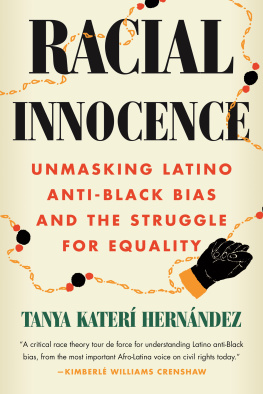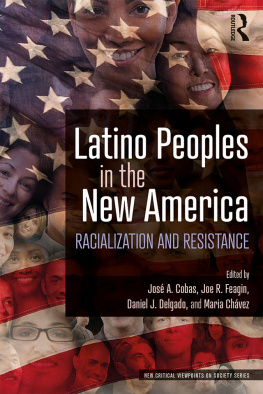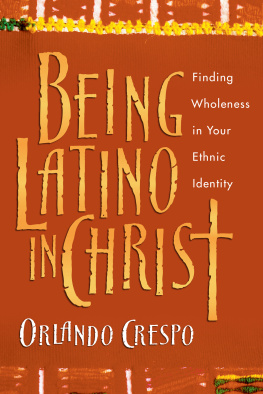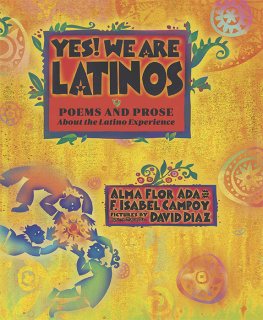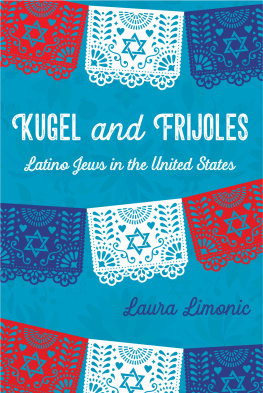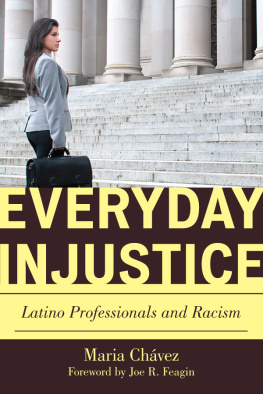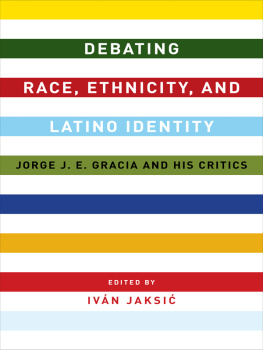Contents
Pagebreaks of the print version
Guide

).
And to James Quentin Walker, for everything always. 

CHAPTER 1
WHAT IS LATINO ANTI-BLACKNESS?
Even before I understood the word nigger,
I heard negro in Spanish.
J OS LUIS VILSON , Afro-Latino educator
Wherever the Negro goes, he remains a Negro.
FRANTZ FANON
L atinos can be racist. Some may be startled to hear this. After all, our national conversations about racism appear oblivious to this fact, and some civil rights leaders are also seemingly reticent to air the dirty laundry of the bias that exists within communities of color, lest it distract from the real racism of White supremacy. However, all the while Afro-Latinos and African Americans suffer from discrimination at the hands of Latinos who claim that their racially mixed cultures immunize them from being racist. I call this the Latino racial innocence cloak that veils Latino complicity in US racism. In turn, public ignorance about Latino anti-Blackness undermines the ability to fully address the interwoven complexities of US racism in developing public policies and enforcing antidiscrimination law. Judges, in addition to the rest of society, need to learn that Latinos can be prejudiced toward both Afro-Latinos and African Americans.
The continued vibrancy of White supremacist attitudes thus cannot be explained exclusively by the perspectives of the declining number of White non-Hispanics. The ongoing upkeep and silent acceptance of anti-Blackness implicates many other racial and ethnic groups in the United States as well as across the globe.
Exploring Latino complicity in anti-Blackness is particularly helpful. As a multihued ethnic group, Latinos are often viewed as free of racism or, at the very least, free of its most exclusionary forms. Examining how anti-Blackness still does manage to manifest itself among the racially mixed rainbow of Latinos (who currently comprise 18.7 percent of the population and are predicted to increase to 28 percent by 2060), is thereby a powerful illustration of how people of color can fortify racism.
All the same, when I tell people that part of my research is on the topic of anti-Blackness in Latino communities (and explain Yes, that is a thing), light-skinned and fair-skinned Latinos often react by telling me that most Latinos and African Americans get along and frequently live in neighboring areas or the very same buildings. In other words, theyre conveying that they do not believe anti-Blackness is a real issue in Latino communities like it is in White non-Hispanic communities.
While it would certainly be ideal if Latinos were all truly color-blind and incapable of committing racist acts, as an Afro-Latina myself I do not have the luxury of indulging in the fantasy of a Latino racial mixture utopia. As I share in the epilogue, the visibility of my familys Black ancestry means I literally have skin in the game of accurately assessing the operation of racism in its many forms. Consequently, this book excavates the voices of Afro-Latinos and African Americans who have actually experienced Latino anti-Black bias, in an effort to help disrupt the public ignorance and Latino disinclination to grapple with Latino anti-Blackness. The need for such an intervention is usefully demonstrated by a consideration of the Latino adoration of Afro-Cuban Queen of Salsa, Celia Cruz.
When Celia Cruz died on July 16, 2003, her wake in Miami attracted at least one hundred thousand fans. Later, when her body was brought to New York City, thousands waited to see her body, exceeding the crowds that honored Judy Garland and Ed Sullivan at the very same funeral home. Anyone viewing the news footage of all the racially diverse Latinos expressing their love for Celia would find it difficult to envision any of those mourners as also harboring anti-Black bias. This dualism is readily apparent in the profound US worship of African American pop star Beyonc, simultaneous with the pervasive killing of unarmed African Americans presumed inherently dangerous.
However, anti-Black racism that arises outside the unfortunately familiar US frame of White non-Hispanic versus African American bias can be mystifying for many people. This is in part because US Blackness is primarily conceived of as embodied solely by English-speaking African Americans. In turn, anti-Blackness is popularly understood as a uniquely US phenomenon affecting those English-speaking African Americans (with occasional recognition of the racialized struggles of Africans and others in the African diaspora). This skewed vision is only compounded by how Latino communities themselves marginalize or entirely erase the existence of Afro-Latinos.
Notably, the seminal volume The Afro-Latin@ Reader: History and Culture in the United States highlights this marginalization in its opening definition:
Afro-Latin@? Whats an Afro-Latin@? Who is an Afro-Latin@? The term befuddles us because we are accustomed to thinking of Afro and Latin@ as distinct from each other and mutually exclusive: one is either Black or Latin@.
The short answer is that Afro-Latin@s belong to both groups. They are people of African descent in Mexico, Central and South America, and the Spanish-speaking Caribbean and by extension those of African descent in the United States whose origins are in Latin America and the Caribbean.
So to be clear, Afro-Latinos are simultaneously ethnically Latino and racially Black.
Generally speaking, ethnicity refers to how individuals are associated with a social group based upon cultural markers like language, religion, customs, traditions, food, geographic origin, and so on, and not primarily their physical appearance. Within an ethnic group, physical appearance can vary widely. Accordingly, when this book refers to Latinos without a racial qualifier such as White or Afro, it is a reference to the general ethnic group of Latinos.
Race is more directly rooted to imposed social hierarchy based upon physical differences or presumed physical differences from That ranking is socially understood as a racial order. The racial social meanings are so deeply entrenched that even individuals without the physical markers are exposed to derogatory stereotypes when their ancestral connections are revealed.
While racial group members in particular geographic spaces can, over time, come to identify themselves as culturally different, racial groups, unlike ethnic groups, have no single culture. Thus, for example, the Black culture of US African Americans is not the same in the South as in the North, and is also distinct from that of Afro-Colombians, Afro-French, Afro-Koreans, and so on. But across all those distinct cultural spaces, racialized physical markers create common experiences of social marginalization.
Racial Blackness and the term Blacks in this book thus includes not only African Americans but Afro-Latinos as well. Afro-Latino poets, novelists, and memoirists have long depicted this duality. Their numbers include but are not limited to writers like Elizabeth Acevedo, Jaquira Diaz, Junot Diaz, Dahlma Llanos-Figueroa, Marianela Medrano, Willi Perdomo, Spring Redd, Daniel Serrano, and Piri Thomas.

